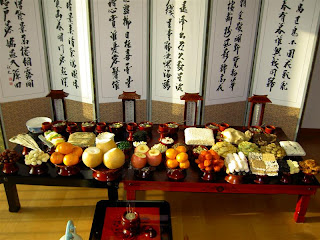New Years as I know it is filled with parties, loud music, countdowns, streamers, confetti and lots of friends. Here, it is very much a family-oriented holiday. The three-day holiday (four for me!) is used by many to return to their home towns to visit their parents and other relatives where they perform the ancestral ritual known as charye. Many Koreans dress up in colorful hanbok (their tradional clothing) and serve traditional dishes such as ri
 ce cake soup. This is for good luck in the year to come. One important part of the day is that children wish their parents a happy new year by performing one deep traditional bow and the words saehae bok manhi badeuseyo which translates to please receive many blessings in the new year. This is one thing that my students love about the day as in return for the bow is usually money (lots of it!).
ce cake soup. This is for good luck in the year to come. One important part of the day is that children wish their parents a happy new year by performing one deep traditional bow and the words saehae bok manhi badeuseyo which translates to please receive many blessings in the new year. This is one thing that my students love about the day as in return for the bow is usually money (lots of it!).Many family games are also played during this time, where ussually all the men play one game while all the women play a different one. Over the weekend, I witnessed a big family tug of war challenge in the park. This was weird due to the fact that most families leave Seoul and head for the country to where they grew up. The subways were empty and all the stores and restaurants were closed. All in all it was great to witness a new holiday for myself and see once again the cultural differences in the way we celebrate our special days of the year.
